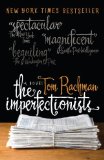Summary | Excerpt | Reviews | Beyond the book | Read-Alikes | Genres & Themes | Author Bio

A Novel
by Thomas PletzingerPicking up Pletzinger's literary tour de force, Funeral for a Dog, feels like crashing a party that is in full swing by the time you walk in the door. If you've ever entered a roomful of people you don't know, but who all know each other, you can relate. It may take some time and some trust in Pletzinger's authorial skill to get into the groove of the book - and maybe a glass or two of wine - but in the end, your efforts will be worthwhile. In Funeral for a Dog, the party-crashing aura exists because the novel begins with the ending - and not some old, trite or tired ending, but with an involved message spaced out across seven picture postcards of Italy's gorgeous Lugano Lake District.  The postcards are from somebody named Daniel to a woman named Elisabeth; they have no context, they make no sense... yet. But pour yourself a glass of nice Chablis and settle in...
The postcards are from somebody named Daniel to a woman named Elisabeth; they have no context, they make no sense... yet. But pour yourself a glass of nice Chablis and settle in...
Soon and in no time at all, the story's bare bones are laid out. Newspaper journalist Daniel Mandelkern is on assignment to interview and compose a profile of children's book author Dirk Svensson. But Daniel is not really a trained journalist. He is a cultural anthropologist who definitely finds the journalistic mantle an uncomfortable fit, a profession forced on him by his wife and editor Elisabeth. At the outset of the story, Daniel's portion of the narrative is cryptic, comprised of his notes and observations for the article on Svensson. Because he continually refers to textbook anthropology for advice on how to profile people, Daniel's notes are more scientific in flavor than they are journalistic. He observes Svensson as if he were another species, like an animal researcher taking notes at the zoo.
Svensson, for his part, does not make Daniel's difficult assignment any easier. Unlike most authors I've known, he doesn't want to be interviewed, much less profiled in some German newspaper. Unfortunately for Daniel, he has arrived at Svensson's doorstep on the anniversary of a very sad day in the author's life. Worse, Svensson's beloved dog Lua is old and terminally ill, likely to die at any moment. There could not be a more inopportune time for entertaining a houseguest, especially a nosy newspaper writer in search of a story. It's too bad that, despite Daniel's observations, questions, and even his reading of Svensson's personal journal, no one (not even the reader) gets to know Svensson. As witnessed in his stream-of-consciousness, meandering narrative, Svensson remains, "a strange man," a scattered, unfettered collage of people, places and things.
Daniel, on the other hand, becomes an open book. Chicago Tribune columnist Mary Schmich is credited with saying, "The movies we love and admire are, to some extent, a function of who we are when we see them." This observation is no less true of the notes that Daniel Mandelkern composes while visiting Dirk Svensson - they are indeed a function of who he is. From the argument with Elisabeth over whether or not they should have a child, to the ambivalent kiss he shares with Svensson's friend and former lover Tuuli, Daniel's notes all come to be about Daniel, by Daniel, for Daniel. As he says, "I take notes to leave a trail, each word a pebble, each sentence a row of little stones."
When Daniel tells Elisabeth that their lives, "are a spiral, not a line," it is an apposite metaphor for the swirling interconnectedness of life's experiences. From love to loss, from birth to death there is no straight line, no single thread untouched and untouchable by others. As this is the character of Pletzinger's novel, so too is it the character of life itself, and while some may not enjoy nonlinear storytelling - or the messiness of life - those who do will be richly rewarded here.
Photo of Lake Lugano including Monte San Giorgio and the Melide bridge (photo from Wikimedia Commons, not Funeral For a Dog)
![]() This review
first ran in the April 6, 2011
issue of BookBrowse Recommends.
This review
first ran in the April 6, 2011
issue of BookBrowse Recommends.

If you liked Funeral for a Dog, try these:

by Tom Rachman
Published 2011
Set against the gorgeous backdrop of Rome, Tom Rachman’s wry, vibrant debut follows the topsy-turvy private lives of the reporters, editors, and executives of an international English language newspaper as they struggle to keep it—and themselves—afloat.

by Jonathan Lethem
Published 2010
The acclaimed author of Motherless Brooklyn and The Fortress of Solitude returns with a roar with this gorgeous, searing portrayal of Manhattanites wrapped in their own delusions, desires, and lies.
Your guide toexceptional books
BookBrowse seeks out and recommends the best in contemporary fiction and nonfiction—books that not only engage and entertain but also deepen our understanding of ourselves and the world around us.